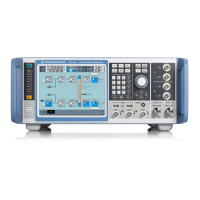Remote Control Commands
R&S
®
SMW200A
947User Manual 1175.6632.02 ─ 16
Example:
SOURce1:BB:ARBitrary:MCARrier:CLIPping:STATe ON
SOURce1:BB:ARBitrary:MCARrier:CLIPping:CFACtor
37
SOURce1:BB:ARBitrary:MCARrier:CLIPping:CUToff
50
Manual operation: See "Clipping" on page 360
[:SOURce<hw>]:BB:ARBitrary:MCARrier:TIME:MODE <Mode>
Selects the mode for calculating the resulting signal period of the multi-carrier wave-
form. The resulting period is always calculated for all carriers in the carrier table irre-
spective of their state (ON/OFF).
Parameters:
<Mode> USER | LONG | SHORt | LCM
*RST: LONG
Example:
BB:ARB:MCAR:TIME:MODE LONG
The resulting signal period is defined by the longest I/Q file in
the carrier table. Shorter I/Q files are periodically repeated.
Manual operation: See "Signal Period Mode" on page 361
[:SOURce<hw>]:BB:ARBitrary:MCARrier:POWer:REFerence <Reference>
Defines the way the individual carriers in a composed multi carrier signal are leveled.
Parameters:
<Reference> RMS | PEAK
*RST: RMS
Manual operation: See "Power Reference" on page 361
[:SOURce<hw>]:BB:ARBitrary:MCARrier:OFILe <OFile>
Defines the output file name for the multi-carrier waveform (file extension *.wv).
This file name is required to calculate the waveform with the commands [:
SOURce<hw>]:BB:ARBitrary:MCARrier:CLOad or [:SOURce<hw>]:BB:
ARBitrary:MCARrier:CREate.
Parameters:
<OFile> string
Example: See Example "Generating a multi carrier signal" on page 926
Manual operation: See "File" on page 364
SOURce Subsystem

